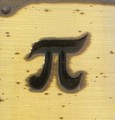¿Qué carajo sabemos?

Marain me pide que me zampe un documental que le ha gustado mucho, What the bleep do we know? (Google video). Le contesto diciendo que me está costando pasar de la mitad. Al principio tenía dificultades para digerir ciertas explicaciones demasiado divulgativas para ser ciertas, pero lo dejé pasar con indulgencia*.
El caso es que ahora está llegando a puntos que me superan. Por ejemplo con eso de los cristales de agua (nombre místico para el hielo) que reaccionan a los sentimientos de la gente. El único tipo de los que aparecen en el vídeo que me está gustando un poco es el de la pizarra negra, que habla como un físico (pero que no lo es). Es el que tiene menos luces difuminadas y glamurosas a su alrededor. Me empezaba a resultar extraño verlo entre el resto de la fauna, pero en la Wikipedia me encuentro que en realidad se descontextualizaron sus intervenciones:
Le recomiendo a Marain un par de capítulos del libro de Martin Gardner Science: Good, Bad and Bogus que están relacionados con esto. Si no con el tema directamente, sí con los experimentos que se mencionan. La percepción extrasensorial, las máquinas de números aleatorios y otras cuestiones se tratan con sano escepticismo, sin centrarse tanto en las conclusiones (que es lo que hace este documental) como en los métodos para alcanzarlas (que es lo que debe de hacer un buen científico).
Buscando una referencia del libro para mandarle me encuentro con otro, Fads and Fallacies in the Name of Science, también de Gardner, que tiene incluso mejor pinta. Acerca del primero leo que no se preocupó de disimular que era una recopilación de cosas sueltas, y se vuelve repetitivo. Esa fue precisamente mi impresión cuando lo leí hace años, y por eso me cuesta recomendarlo. Pero si el segundo es más ameno y contiene la misma chicha, estupendo.
Como preparación para una futura charla le anticipo que no me considero de los que intentan explicarlo todo con nuestro conocimiento actual, y que no critico las ideas del documental porque piense que yo tengo todas las respuestas. Por supuesto que no.
Las critico porque eso es precisamente lo que ellos hacen, aunque peor: intentan explicar (o al menos sugerir una posible explicación para) todos los misterios del universo y de la mente con un cóctel engañoso de conocimiento real mezclado con creencias indemonstrables, sugiriendo que la ciencia les avala. Dependiendo de lo que les resulte conveniente se apoyan en la ciencia, o la extrapolan sin limitaciones. Mezclan ciencia con filosofía ligera y literatura de una manera que me parece incorrecta. No porque la ciencia sea mejor que las otras, sino porque la actividad científica es muy limitada y sólo se puede aplicar en situaciones muy controladas. Cuando la sacas de su territorio ya no sirve, y si lo haces de esta manera estás básicamente convirtiéndola en religión. En la modestia de la ciencia reside su grandeza. Y si bien la Filosofía de la Ciencia tiene mucho sentido, hacer ciencia de la filosofía tiene siempre tufillo a pratraña.
* Por ejemplo, se habla del efecto del observador sobre lo observado con cierta sorpresa alucinada, como si fuese magia cuántica, obviando que el observador también es un sistema físico, y que observar es siempre un proceso que implica interacción y no una abstracción sin contacto. Eso también es clásico.
5 comentarios
nike shox o'nine -
Air Jordan shoes -
googlebot -
http://miarroba.com/foros/ver.php?foroid=853403&temaid=3840491
googlebot -
¿Qué carajo sabemos?
Marain -
seriously, let alone litteraly. Personally I enjoyed watching it because it gave me 'food for thought. In my opnion modern physics has never been able to provide a description of all of reality (including consciouness IMHO), although several physicist pretended it did, most physicist tend to interpret the modern 'beautiful' theories (eg. QED, QCD, but also the relativistic formulation of Maxwell theory) as truth rather than just a model, because of the elegance and symmetries of the mathematical equations, for me this argument has always been very appealing (almost religious), but I always kept
in mind that it cannot represent the whole truth.
I never heard of a satisfactory interpretation of quantum mechanics, the Copenhagen one can not describe everything because of the observer's position,
I think Schrodinger's cat is a silly metaphore that actually show the limitations of how one can interpret QM, if there was a human observer in the box with Schrodingers cat, would the wavefunction have collapsed earlier for him.., would this have affected the situation for the observers who did not yet know whether the cat died.., it somehow suggests that every observer has his own wavefunction, this makes no sense of course; the cat is either dead or not. To what extend can one assign truth to such a theory.
I never heard of any of the physicians or physicists in the movie, and they all looked like they were floatin in space or psychotic, I'll check
out the URLs you send me later on. I remember this Scottish priest or whatver who made some wise remarks.
The water-blessing experiment intrigueging when I first heard about it, after some google searches I found scientists bashing the
findings, the 'experiment' could not be reproduced. However if it could have been reproduced, somehow, I wouldn't have been surprized..
As a physicist I'll always insist on taking a rational approach and not become a poet, I heard neuropsychologists are making a good effort on
describing and isolating mechanisms (still the reductionists approach
instead of the holistic).
Maybe our views on these matters are not that different, we'll find out.